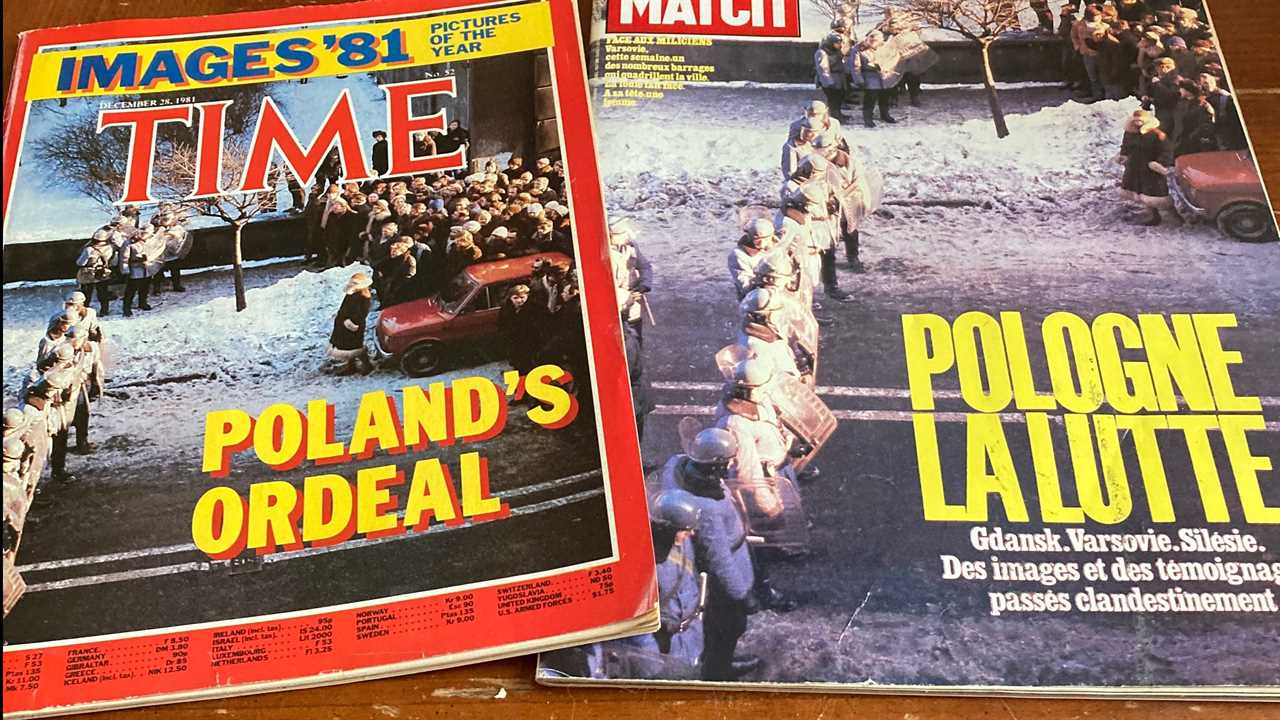On December 13, 1981, martial law was imposed in Poland and the first independent trade union in Communist Eastern Europe, Solidarity (Solidarnosc), with over 10 million members, was forcibly dissolved by the Polish military. Dozens of people were killed or injured in the violent crackdown, tens of thousands of officials – including Solidarity leader Lech Walesa, who later won the Nobel Peace Prize, were arrested.
General Wojciech Jaruzelski, who was also the then-prime minister and head of the Communist Party, had planned the imposition of martial law months before to break the growing power of Solidarity. Whether he was forced to do so by the Kremlin remained unclear.
As a reporter for Austrian magazine profil, I experienced the imposition of martial law as the only journalist from Austria who was present in Warsaw. The then-profil editor-in-chief Peter-Michael Lingens feared an invasion by Soviet troops as was the case in 1956 in Hungary, in 1968 in Czechoslovakia and Afghanistan in 1979.
Lingens gave instructions that a profil reporter had to be present in Poland at all times. He was to be proved right, but it was the Polish army that destroyed the hopes of many Poles for a life of freedom and dignity as had been preached by the Polish-born Pope John Paul II.
On a freezing Sunday, in December 1981, armored cars were parked in important places in the capital. Army troops and units of the ZOMO special police patrolled the streets. Demonstrators gathered in front of the Solidarity headquarters on Mokotowska Street in Warsaw, which had been sealed off by the police. From the balcony of a flat, I captured the scene with my camera. I later smuggled one of the slides to Vienna, which ended up on the covers of TIME magazine, Paris Match, Espresso and other magazines.

It was not until the beginning of 1989 that Poland’s Communist regime, facing economic bankruptcy, sat down with the Solidarity functionaries at the “round table”, where a peaceful power-sharing agreement was reached. Partly free parliamentary elections were held in June 1989 where the Catholic intellectual Tadeusz Mazowiecki formed a government.
Walesa, himself, was elected president in 1990.
The Solidarity movement later split into two parties: The more left-liberal Civic Forum (PO) and the increasingly right-wing PiS (Law and Justice) party led by the Kaczynski twins. The PiS party under Jaroslaw Kaczynski, which came to power in 2016, today leads an arch-conservative course against the EU, one that is also anti-Semitic. Only this year, the already strict abortion law in Poland was further tightened, triggering mass protests.
There was a split between the majority liberal-ruled cities and the countryside, where the PiS continues to dominate. During demonstrations against the government, the unofficial anthem of Solidarity, the song Mury (Walls) about the collapse of the old world, could be heard again.
The Polish government’s many conflicts with the EU leadership over undue interference in the judiciary escalated last October. The Polish Constitutional Court, composed of judges loyal to PiS, declared two articles in the EU treaties incompatible with Polish law. This undermined an EU principle that EU law takes precedence over national law.
In the meantime, the European Court of Justice has imposed binding penalties on Poland. For example, Poland must pay a fine of €1 million for each day that the controversial Judicial Disciplinary Board, as demanded by the EU, continues to exist. Thus far, Warsaw has so far refused to pay.
The European Commission has already frozen the share of COVID aid reserved for Poland – €20 billion in grants and billions more in loans. And in the next step, the subsidies for Poland from the normal EU budget – €12 billion net, annually – could also be stopped if the PiS government does not give in. The government in Poland has even floated the idea of leaving the EU, but the population’s approval for Europe has been remained fairly high.
A Polish lawyer, and a member of a German-Polish foundation for reconciliation, Pawel Kuglarz, sees the origin of the current conflict in the missed purge of Communist judges and prosecutors after 1989.
“In addition to the economic, political and legal reforms, the question of an honest reckoning with the Communist legacy was of great importance. The basis for a real coming to terms with the past is decommunisation, lustration, i.e. the examination of collaboration with the secret services, criminal rehabilitation and punishment of the perpetrators. This chance was missed. And when the PiS-government started the purge quite late, the EU saw it as a breach of the independent judiciary.”
Of great importance in the scheme of all this is Poland’s head of government, Mateusz Morawiecki, who does not want to give in to the EU’s demands and has openly threatened Brussels.
-------------------------------------------
By: Nicholas Waller
Title: Poland’s deep divide
Sourced From: www.neweurope.eu/article/polands-deep-divide/
Published Date: Tue, 14 Dec 2021 09:53:12 +0000
Read More
 UK PoliticsWorld PoliticsVideosPrivacy PolicyTerms And Conditions
UK PoliticsWorld PoliticsVideosPrivacy PolicyTerms And Conditions
